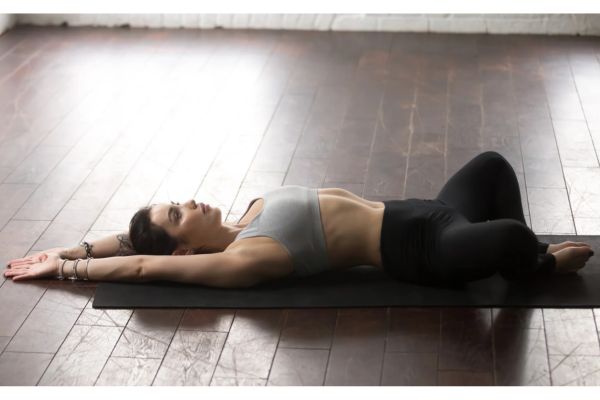In today’s fast-paced world, sleep often takes a back seat to the demands of modern living. The pressures of work, family, and social obligations, coupled with the constant presence of technology, have led to widespread sleep deprivation. The irony is that while sleep is essential for our overall well-being, many of us struggle to get the rest we need.
In this blog, we will explore how modern lifestyles are robbing us of sleep, the impact of poor sleep on health, and most importantly, strategies you can adopt to improve sleep quality. From yoga for sleep and yoga for stress relief to holistic health and wellness practices like sound healing sessions, these techniques will help you reclaim your rest and restore balance in your life.
The Impact of Modern Lifestyles on Sleep
Modern lifestyles are rife with elements that disrupt our natural sleep patterns. Some of the main factors include:

- Technology Overload
The rise of smartphones, laptops, and other digital devices has led to constant connectivity. The blue light emitted from screens interferes with the production of melatonin, the hormone responsible for regulating sleep. Late-night scrolling, binge-watching, or working on electronic devices can delay sleep onset and disrupt sleep cycles. - Work Stress and Overcommitment
Many people today face mounting work pressures and are often overcommitted in both their personal and professional lives. Tight deadlines, financial concerns, and the need to perform can lead to chronic stress, which triggers the body’s fight-or-flight response. This stress can keep the mind racing, making it difficult to relax and fall asleep. - Sedentary Lifestyles
A lack of physical activity is another contributor to sleep problems. With many of us sitting for long hours at desks, working from home, or engaging in minimal physical movement throughout the day, our bodies do not expend enough energy to promote restful sleep at night. - Irregular Sleep Schedules
The demands of modern living often cause people to maintain inconsistent sleep schedules. Late nights out, shift work, or even staying up to finish tasks can cause irregularities in our circadian rhythm—the internal clock that regulates sleep-wake cycles. - Diet and Stimulants
The foods we eat and the beverages we consume also impact our sleep. High-caffeine drinks, sugar-laden snacks, and late-night meals can all disrupt sleep patterns, making it harder to fall asleep or stay asleep throughout the night.
The Consequences of Sleep Deprivation
Sleep deprivation can have far-reaching consequences on both physical and mental health. Some of the major effects include:

- Weakened immune system: Chronic lack of sleep can weaken the immune system, leaving you more susceptible to illness.
- Cognitive impairment: Sleep is essential for brain function, including memory, concentration, and problem-solving. Lack of sleep leads to impaired cognitive function, making it harder to focus and process information.
- Mood disorders: Poor sleep is closely linked to increased stress, anxiety, and depression. Over time, it can take a toll on emotional well-being.
- Weight gain: Sleep deprivation is associated with weight gain due to its effect on hormones that regulate hunger and metabolism.
- Increased risk of chronic conditions: Long-term sleep deprivation is linked to an increased risk of conditions like hypertension, diabetes, and heart disease.
Reclaiming Rest: Strategies to Improve Sleep Quality
If you’re struggling with sleep due to the demands of modern living, there’s hope. By adopting a few key strategies, you can improve the quality of your sleep and restore balance to your body and mind. Let’s dive into some effective techniques.
1. Yoga for Sleep
Yoga is an ancient practice that promotes relaxation, flexibility, and balance. It can be particularly beneficial for improving sleep quality by helping to calm the mind and release tension in the body.
- Yoga Nidra (Yogic Sleep): Yoga Nidra is a powerful meditation technique that guides the body into a state of deep relaxation, similar to sleep. This practice can help improve both the quality and quantity of sleep by activating the parasympathetic nervous system, which encourages rest and recovery.
- Restorative Yoga: Gentle, restorative yoga poses like legs-up-the-wall (Viparita Karani) and child’s pose (Balasana) promote relaxation and stress relief, making them ideal for winding down before bed.
- Pranayama (Breathing Exercises): Simple breathing exercises like alternate nostril breathing (Nadi Shodhana) or 4-7-8 breathing can calm the nervous system and prepare the mind and body for restful sleep.
Incorporating yoga for sleep into your daily routine can help you unwind and set the stage for a night of deep, restorative rest.
2. Yoga for Stress Relief
One of the most common reasons people struggle with sleep is stress. Stress activates the body’s sympathetic nervous system, also known as the “fight or flight” response, which can make it difficult to relax and fall asleep.
Yoga for stress relief focuses on gentle movement, breath control, and meditation to soothe the nervous system and alleviate the physical and mental effects of stress. Specific yoga poses, like forward folds and gentle twists, encourage relaxation by releasing tension from the muscles, while meditation practices can help calm racing thoughts.
- Cat-Cow Stretch (Marjaryasana-Bitilasana): This pose helps release tension in the spine and promotes relaxation.
- Seated Forward Bend (Paschimottanasana): A calming pose that stretches the hamstrings and back while helping to quiet the mind.
Incorporating yoga for stress relief into your daily routine can significantly reduce the stress that keeps you awake at night.

3. Sound Healing Sessions
Sound healing sessions use vibrational frequencies to promote relaxation and balance in the body. Instruments like Tibetan singing bowls, gongs, and tuning forks are used to create sounds that resonate with the body’s natural frequencies, inducing a state of deep relaxation.
Sound healing can be particularly effective for sleep because it works by calming the nervous system and reducing stress hormones like cortisol. As you lie down and listen to the soothing sounds, your brainwaves slow down, transitioning into the theta state, which is associated with deep relaxation and sleep.
By incorporating sound healing sessions into your routine, you can promote a more restful state of mind and body, making it easier to drift into a deep and rejuvenating sleep.
4. Holistic Health and Wellness Practices
Improving sleep quality requires a holistic approach that addresses all aspects of your health—physical, mental, and emotional. Adopting holistic health and wellness practices can help balance your overall well-being and promote better sleep. Here are a few key practices to consider:
- Mindfulness Meditation: Mindfulness practices, such as meditation and journaling, can reduce stress and anxiety by promoting awareness and relaxation. Practicing mindfulness before bed can help you let go of the day’s stressors and prepare your mind for restful sleep.
- Aromatherapy: Essential oils like lavender, chamomile, and sandalwood have calming properties that can help ease anxiety and promote relaxation. Using these oils in a diffuser or applying them to your pulse points before bed can create a calming bedtime ritual.
- Dietary Changes: Consuming foods rich in magnesium, such as leafy greens, nuts, and seeds, can support muscle relaxation and promote sleep. Additionally, avoiding caffeine and sugar before bedtime can reduce sleep disturbances.
By incorporating these holistic health and wellness practices into your daily routine, you can address the root causes of your sleep issues and create a foundation for lasting rest.
5. Creating a Sleep-Friendly Environment
Your sleep environment plays a crucial role in the quality of your rest. Here are a few tips for creating a sleep-friendly space:
- Darken the Room: Exposure to light, particularly blue light from electronics, can interfere with the production of melatonin. Use blackout curtains and turn off all electronic devices at least an hour before bed to create a dark, sleep-friendly environment.
- Set the Right Temperature: The ideal sleep environment should be cool, between 60 and 67 degrees Fahrenheit (15-20 degrees Celsius). Use breathable fabrics for bedding and clothing to stay comfortable throughout the night.
- Reduce Noise: If you’re sensitive to noise, consider using white noise machines or earplugs to block out disruptive sounds.
By optimizing your sleep environment, you can create the perfect setting for a restful night’s sleep.

Finding a Wellness Studio Near You
If you’re ready to reclaim your rest and improve your overall health, consider seeking professional support at a wellness studio near you. Many wellness studios offer a variety of services designed to improve sleep quality, such as yoga for sleep, sound healing sessions, and holistic health consultations.
Look for a wellness studio near me that provides personalized guidance and a range of holistic services. Whether you’re interested in yoga, sound healing, or meditation, finding the right wellness studio can be the first step towards better sleep and a healthier lifestyle.
Conclusion
Modern lifestyles may be robbing us of sleep, but by adopting sustainable practices like yoga for sleep, yoga for stress relief, sound healing sessions, and holistic health and wellness approaches, you can reclaim the rest you deserve. Implementing these strategies will not only improve your sleep quality but also enhance your overall well-being.
Don’t let the demands of modern living stand in the way of restorative rest—start incorporating these practices into your routine today for better sleep and a healthier, more balanced life.
